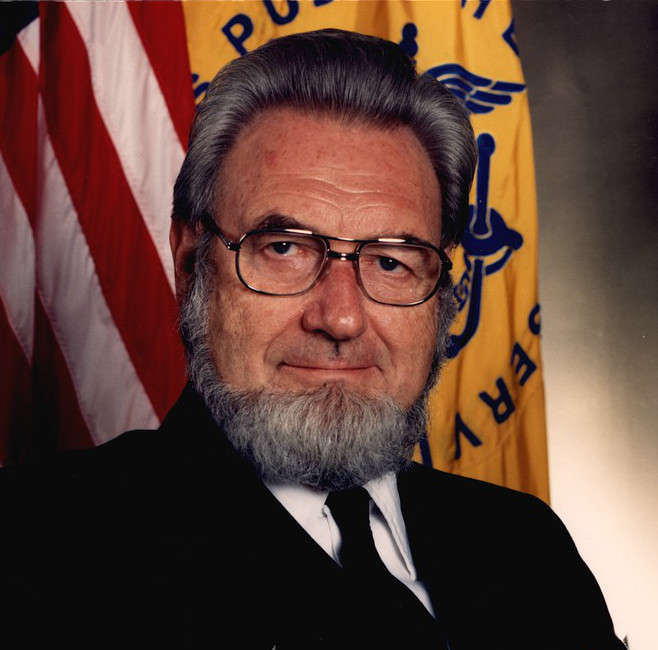Home » Fighting the Last Pandemic: When Dr. Fauci met Dr. Koop
Fighting the Last Pandemic: When Dr. Fauci met Dr. Koop

From the blog of the Institute for Science, Society and Policy of the University of Ottawa, Canada
https://issp.uottawa.ca/en/news/fighting-last-pandemic-when-dr-fauci-met-dr-koop
Photo by Arya Pratama on Unsplash
Nigel M. de S. Cameron
Senior Fellow and former Fulbright Research Chair in Science and Society, Institute for Science, Society and Policy, University of Ottawa
President Emeritus of the Center for Policy on Emerging Technologies, Washington, DC
It’s exactly 40 years since President Reagan nominated as Surgeon General the man who would go on to lead the fight-back against AIDS, renowned social conservative and presbyterian Christian Dr. C. Everett Koop (Chick, to his friends). As Dr. Fauci (Tony, to his friends) summed him up, “Chick was always respectful, but he did not much care what other people thought of him…. He had such a strong inner moral compass.”
When I called him the other day, Tony Fauci took a few minutes off from Covid-19 to tell me how they first met. Koop had just been appointed, and Fauci, as an MD on staff at the National Institutes of Health, was asked to give him a physical. Then, as AIDS began to kill by the thousand, Koop would stop by Fauci’s office on his way home to learn from the world’s top expert on infectious diseases, and they became friends. Yes, the same Fauci; still there, four decades later, guiding the U.S. response to Covid-19 at the age of 80.
But who was Koop? When Reagan nominated him he had just retired as the world’s most famous pediatric surgeon. It was Koop who set up the first NICU, guided the specialty of pediatric surgery through to board certification and edited its first professional journal, and became world-famous separating conjoined twins. He shared with Fauci two special features. They were both appointed to top jobs young – Fauci as Director of the National Institute for Allergy and Infectious Diseases at 43, Koop as Chief of Surgery at the Children’s Hospital of Philadelphia at 30. And they were both from Brooklyn.
Koop’s confirmation by the Senate was predictably stormy. His stalwart pro-life convictions attracted a lot of criticism. And his expertise was not in public health – he was famous for doing operations on babies. He scored his very own denunciation from the editorial board of the New York Times: “Dr. Unqualified.” (The Times would later apologize.)
Koop was not deterred. He worked on building relationships across party lines. And nine long months later, when a vote finally came, even a majority of Democrats swung in support of his confirmation.
Another consequence of the delay and the controversies: Koop was becoming very well known. While the office of Surgeon General has only a tiny staff and budget, fame – coupled with a reputation for plain speaking – soon gave him a growing moral authority to speak to the nation as “America’s family doctor.” (When some of the conservatives who had helped him get him the job later turned against him, they couldn’t get him fired.)
As the 1980s progressed and AIDS spread, the Reagan White House had small interest in addressing what was widely seen as the “gay disease.” But finally Reagan called on the bearded, forthright, social conservative Surgeon General to spearhead the nation’s response.
Koop’s report on AIDS in October 1986 was a watershed. Surgeon General reports are generally lengthy and written by expert committees. The 1988 smoking report, for example, runs to 640 pages in tiny print. Yet the AIDS report is a scanty 36. Koop wrote it himself. It was followed with a pamphlet that summarized its conclusions – mailed to every household in the country (a first).
To the surprise of the right and the left, Koop declined to moralize about AIDS. He slapped down suggestions that sufferers be quarantined long-term or (one proposal) tattooed. As he worked on the report, with Fauci briefing him on the latest research, he sat down with leaders of the gay community. They had started out fearing this man who had had no problem calling gay sex “sodomy.” In the end, many regarded him as their hero.
Part of his life-saving prescription was “safe sex” – and sex education, including the use of condoms from elementary school age. The mainstream press now lionized the man they had once subjected to bitter criticism; many conservatives were horrified. Koop’s response was a characteristic broadside, and a classic of public health: “I am the surgeon general of the heterosexuals and homosexuals, young and old, married and unmarried, moral and immoral. I don’t have the luxury of deciding which side I want to be on. So I can tell you how to keep yourself alive no matter what you are. That’s my job.”
Chick Koop died in 2013 at the age of 96. He loved children and had spent much of his long life going to extraordinary lengths to save the lives of babies before and after birth. But, as America witnessed during his glory days as Surgeon General, his love of life was not restricted to them. He took the campaign against smoking to new heights, naming secondary smoking a killer and nicotine an addictive drug (smoking dropped by more than one-quarter during his eight years in office). He highlighted public health issues from the importance of breastfeeding to the growing domestic violence crisis. And he led the United States, and the global community, into a humane and candid approach to the deadly HIV pandemic.
* * * * *
I first met Chick back in 1986, and we became friends. Two decades later I was privileged to join his 90thbirthday celebration in Washington DC’s Cosmos Club. The high point of the evening was his speech on the need for healthcare reform. The evening was co-hosted by his friend Hillary Clinton.
Later, Republican Senator Orrin Hatch, our other co-host, had this to say. “I remember so many things that this wonderful man did. He became one of the most popular people ever in the history of government. And we all love him to this very day.”
Dr. Nigel Cameron is writing Dr. Koop’s biography.





